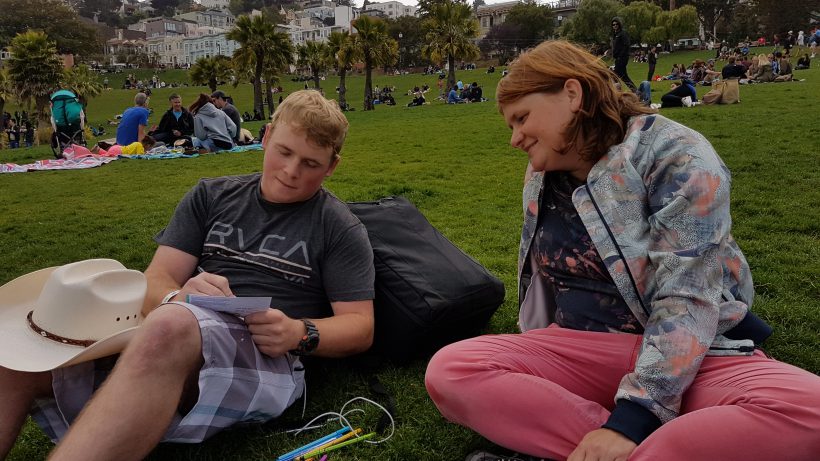The lady who I just met and offered me lunch smiles: ‘You just talked to us, but there are bad people in the world. Stay away from them!’
In the US people warn me everyday when I’m on the streets asking people to draw a beautiful moment. It ranges from the general ‘be careful’ to detailed instructions: Neighborhoods I shouldn’t go to. How I should stay near buildings because of the cameras. How I never should walk up to groups of men or people having certain hair cuts. One man told me a cautious tale on how his sister got raped.
A kind gesture?
At first I was taken away by these warnings. Is the world is that bad? What is the background for this negative world view? Then I saw the warnings as a kind gesture. These people care enough about me to want me to be safe. To be unharmed. It’s sweet they do this. The advice comes from a good a loving place. People want to raise the awareness that not everybody can be trusted. However when I’m approaching people on the street, that isn’t a question I want to think about.
Being careful
Not thinking about whether I can’t or cannot trust a person doesn’t mean I don’t care for my safety. It are different questions. In general I walk up to everybody, but there are limits. Near the San Francisco library a homeless man was drawing his moment. I didn’t approach the man right next to him. Since he was holding a syringe, ready to give himself a shot of heroin.
Also with drunk people I’m careful. I’m a non-drinker myself and as a result from that I don’t have much experience with drunk behavior from others. For me the behavior of drunk people is sometimes unpredictable so I tend to avoid drunk people.
And sometimes warnings are useful. The advice not to walk up to people with hands in their pockets, because there might be a gun there, is solid advice when I’m in a neighborhood which has deadliest summer in 20 years, because of shootings. But for the vast majority of cases the world isn’t as bad as it seems.
The real danger
The real danger are the warnings themselves. Warnings are detrimental and don’t necessarily lead to a safer future. They can lead to feelings of unsafety, anxiety and unhappiness. For the person who warns me and for myself.
But not only can it make me feel unsafe, it can actually harm my safety. I’m gone if I walk up towards somebody and in my head a little voice goes ‘ Can you really trust them?’. At that point I’m not completely in the moment and I might not pick up signals which I should pick up.
Another result of that little voice is that I’m not completely there for the other person and I don’t give the person all the attention he deserves. Or the other person might not trust me, because I come across a little absent. Only by really connecting with the other person, by being open, we learn that we can trust a stranger. In a world with a lot of tensions, more trust is to only way forward.
So don’t warn me. Don’t tell me I have to be careful. That I might get hurt. Maybe I’ll, maybe I don’t. I would rather take the risk of being punched in the stomach than thinking I can’t trust the person I walking up to. From the 17.000 strangers I have approached no one has even come close to yelling at me. I haven’t seen violence or anything like that. And it didn’t matter where in the world I was. So please, don’t tell me I should watch out for strangers.
So don’t warn me. Don’t tell me I have to be careful. That I might get hurt. Maybe I’ll, maybe I don’t. I would rather take the risk of being punched in the stomach than thinking I can’t trust the person I walking up to. From the 17.000 strangers I have approached no one has even come close to yelling at me. I haven’t seen violence or anything like that. And it didn’t matter where in the world I was. So please, don’t tell me I should watch out for strangers.

In Dolores Park, San Francisco. Photo is taken by Sarah Hunt.


Leave a Reply